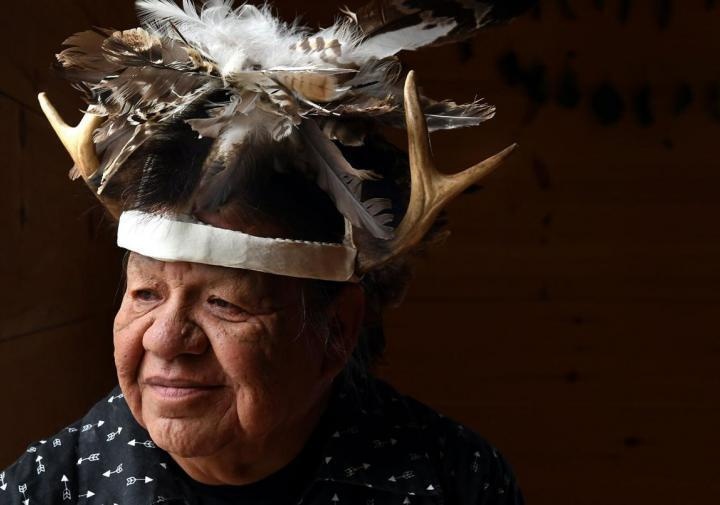
- Goldwin Smith G64
Sachem Sam George is one of ten Sachems (chiefs) for the Cayuga Nation, representing the Bear Clan. He was condoled in April 2005. Having grown up on Seneca Nation territory (Cattaraugus) and having learned Seneca language and customs, Sachem George sought out to learn his Cayuga heritage.
The Haudenosaunee people are a matriarchal society, his mother Cayuga, he knew it was important to learn what it meant to be Cayuga. When he moved back to his home land in 2014, as one of the first important tasks, he oversaw the building of the Cayuga School House, modeled after a contemporary long house. Sachem George has participated, along with the other returning Cayugas, in learning his language and ceremonies. He is taking that knowledge and wisdom to ensure a good future for his people.
Sachem George sits on the Haudenosaunee Environmental Task Force addressing environmental degradation in Haudenosaunee communities by developing culturally appropriate environmental education, restoration and protection strategies. He is a member of the Haudenosaunee External Relations Committee, which works on political and governmental structures beyond the borders of Haudenosaunee Nations. Sachem George is on the Elders Council for Native Community Services for Buffalo and Niagara Falls. In 2019, he was awarded the Bundled Arrow Award for his service to Native American communities.
Sachem George has felt it important to be good neighbors and promotes the Great Law which is created and maintained by the Good Mind – a mind that is both “used well” and "used for good," since one will inevitably lead to the other. Sachem Sam George lives with his wife in Union Springs, Cayuga Territory. He has two sons, a daughter and three grandchildren that live in the greater Buffalo area.
Sachem George is among a group of Haudenosaunee community leaders partnering with the David M. Einhorn Center for Community Engagement to build relationships between the university and regional Indigenous communities.
This event is co-sponsored by the Einhorn Center and the American Indian and Indigenous Studies Program (AIISP). Refreshments will be provided.
